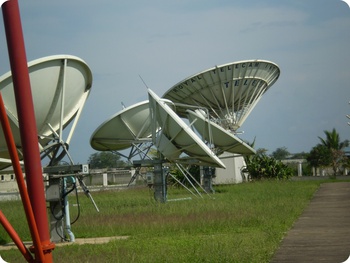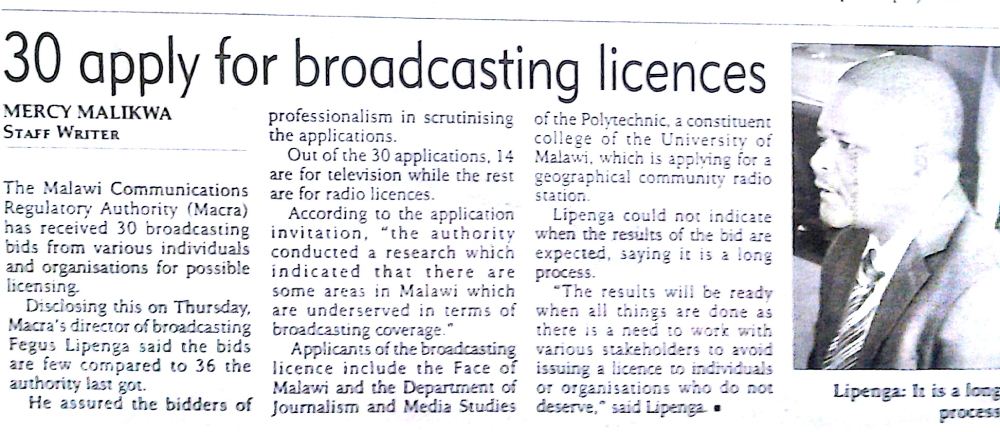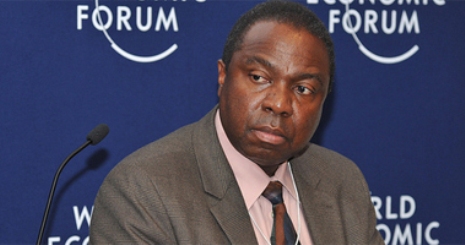The Malawi Communications Regulatory Authority (Macra) has taken the Consolidated ICT Regulatory Management Systems (CIRMS), popularly known as the “spy machine”, to the supreme court of appeal to challenge the high court August ruling that stops the regulator from going ahead with the implementation of the expensive equipment.
Macra’s Director General Charles Nsaliwa told the media that they have not relented on the authority’s resolve to put the machine in place, saying it was purely aimed at “quality control of services” offered by the country’s telecommunication service providers.
“The notice of appeal has already been filed at the Supreme Court,” he said.
The court is yet to set dates for the start of hearing of the case.
The high court’s August ruling came a year after another judge who presided over the matter as a commercial case restrained Macra from getting Call Details Records (CDRs) from the country’s telephone operators, as a requirement to have the machine operational.
But in the High Court ruling, Judge Justice Healy Potani prohibited Macra from going ahead with the installation of the machine, saying it has no mandate, powers or jurisdiction to implement the CIRMS.
“It is unreasonable, [and] not necessary in an open and democratic society,” said Potani, who added that such an action is not recognised by international human rights standard.
Concerned citizens Eric Sabwera and Hophmally Makande took the matter to court where they challenged the use of the machine to monitor and analyse all telecommunication traffic.
They also challenged the directive by Macra to all telecommunication operators to provide it with subscribers CDRs.
In their argument, the two argued that the decision by Macra was unreasonable, not backed by any law and would infringe upon their constitutional right to privacy.
Potani ruled that Macra has failed to satisfy six necessary requirements that the operation must be prescribed by law, reasonable, recognised by international human rights standards, necessary in an open and democratic society, of general application and must not negate the essential content of the right to privacy.
“The impression and implication I get is that the machine could be set up in such a manner that would make it capable of tapping the content of telecommunications traffic. One would tend to wonder, justifiably with suspicion, why Macra would opt to use a system or gadget that has great potential of abuse,” ruled the Judge.
This was based on Macra’s argument during the hearing when it said as a regulator; it has the right to monitor the performance of telecommunications service providers particularly on quality, efficiency and reliability of service and revenue generated.
The judge squashed this argument by stating that he had very serious doubts that Macra would really need caller details in order to monitor performance, quality of service or indeed revenue generated.
Since the machine was going to be used to access all call subscriber details, including what numbers a mobile phone had called, the judge declared that this was an invasion of people’s privacy.
“The machine has the potential to be abused as it had the capability to eavesdrop into people’s conversations, emails and text messages,” pointed out the Judge.
But in the event that they have lost the appeal stage, Macra’s board will consult with govt on what to do with the machine.
Politicians and human rights activists led mass protest and challenged implementation of the ‘spy machine’ as it was meant to be snooping on people’s conversation, checking on people’s emails and texts which sent panic waves.
The country’s four operators, Malawi Telecommunication Limited (MTL), Telecom Networks of Malawi (TNM), Airtel Malawi and Access Communications Limited (ACL) also challenged Macra on the machine.
In their submission, Macra argued that while the machine was capable of listening into people’s conversation, it had no intention to use it for that purpose but only wanted information on calling numbers, dialled numbers, duration of calls, devices used and the call junction and location of the caller.
During his ruling, Potani referred to the first ruling in the commercial case of 2011 where the presiding judge ruled against Macra
“I would tend to agree that it is unreasonable and not necessary in an open and democratic society for subscribers call details to be laid bare wholesale,” said Potani in agreement in the first ruling.
“The reliefs sought by the applicants are therefore granted and accordingly it is ordered that the respondent has no mandate, powers and jurisdiction to implement its decision and there it’s prohibited and restrained from implementing the decision,” said the judge.
After the high court ruling, the President of Association of Telecom Operators, Saulos Chilima, said as an industry, they were vindicated with the ruling as they believed that the machine does not add any value to anyone.
The association says it will never comment again on the machine.




